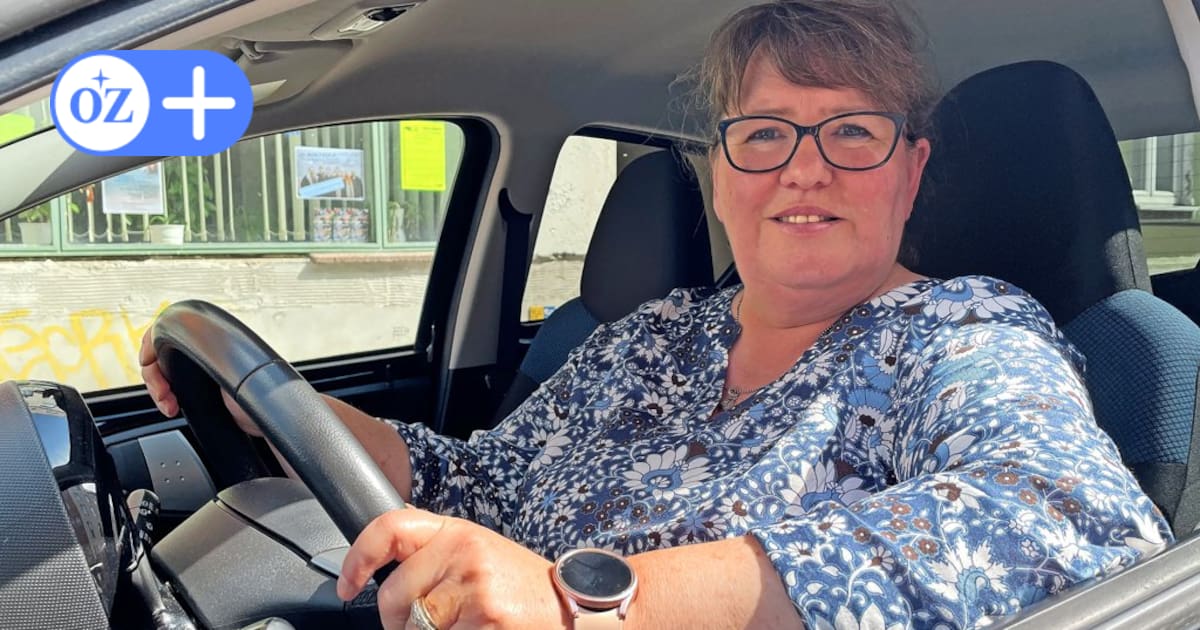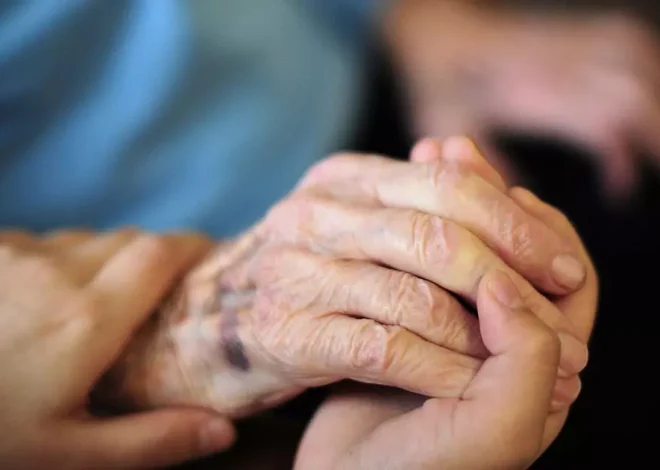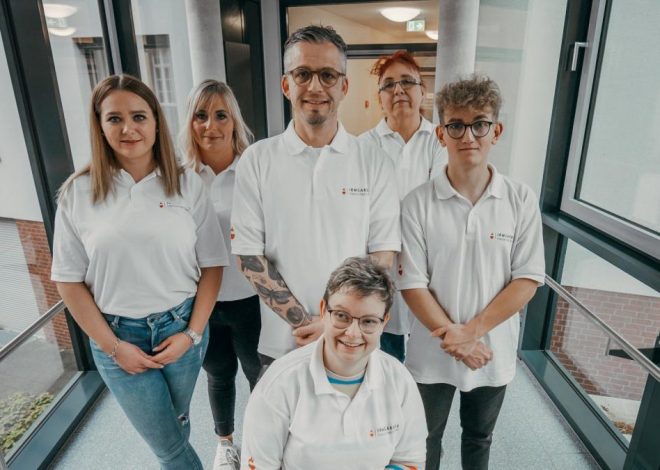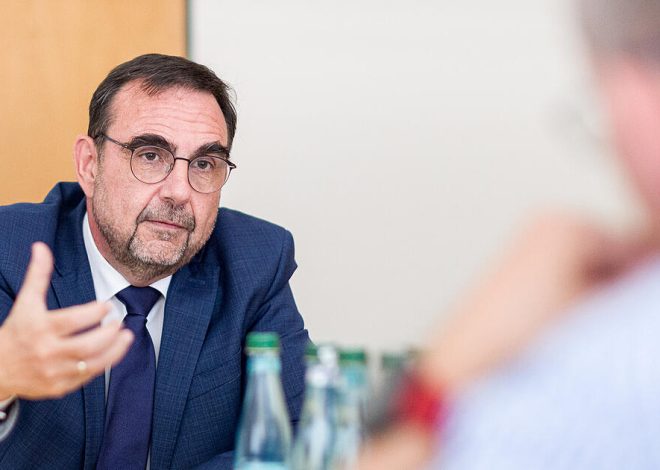
Woman from Wismar switches from retail to care: “Here I experience much more gratitude”
Wismar/Grevesmühlen. She worked in retail for 25 years. When she found out that she was being made redundant, Andrea Witt decided to take a completely different career path. “I wanted to get out of the rat race,” says the 53-year-old. She went into nursing. “Here I experience so much gratitude. That has hardly been the case in retail lately.”
Read more after the Advertisement
Read more after the Advertisement
She found a 30-hour job in a care facility in Wismar. She was looking for something meaningful to do in her free time – and found it with people in need. There is the man in the care home who always has a grateful smile for her. Or the couple where the wife is a recovering alcoholic. As different as people are, they have one thing in common: they can no longer manage their finances on their own due to mental, physical or emotional impairments. There are either no relatives who could take over this task or they live far away. Andrea Witt is volunteering as a carer for them – and is thus serving a field that is desperately looking for new talent.
Multi-day training for beginners
There are currently 54 in the district. Anne Baetke from the care association “Der Weg” in Grevesmühlen knows from her work that this is not enough. She is an association supervisor and is happy about every volunteer who “takes the easy cases off the hands of the carers who, like her, do the work professionally,” as she says. “In other words, cases where the most important things have been taken care of. Clearing out an apartment or high debts, for example,” she lists.
Read more after the Advertisement
Read more after the Advertisement
118 people in the district are currently receiving help from volunteer carers. Andrea Witt found out about the volunteer work through an ad in the newspaper. In order to get the necessary skills, she took part in a training course lasting several days. This takes place every autumn. Up to 15 people usually take part. “But in the end, usually only two or three stay,” regrets Anne Baetke.
Volunteer carer: “I like to help”
One of them is Andrea Witt. She has been a volunteer carer since 2017. She currently has four cases that were referred to her by the care authority. She obtains bank statements for those affected, goes to the authorities and also takes the time to talk to them. “That’s important. Sometimes I’m the only person I can talk to because no relatives are there,” she says. Her father was seriously ill in 2005. “I had to search for where I could apply for something. It was torture. I’m happy to help so that this doesn’t happen to others,” she explains her motivation for becoming a volunteer carer.
also read
“I want to pass on something good”
Michael Köthe from Kalkhorst also uses his free time in retirement to help others. “I want to pass on something good,” says the 66-year-old, who worked in sales for 40 years. “It’s fulfilling. The gratitude in the eyes of those I care for is priceless.” His parents were in need of serious care. “I’m happy to be able to pass on something from my wealth of experience to others now.”
Read more after the Advertisement
Read more after the Advertisement
Michael Köthe (66) is currently looking after three people. He receives support from Anne Baetke from the care association “Der Weg” in Grevesmühlen.
Source: Jana Franke
He is currently looking after three people, including one in need of intensive care. “Fighting against windmills is not always easy,” he admits, and lets us in on the inside story of the authorities. The bedridden, in need of intensive care needed things that would mobilize his muscles. “A lot of things were rejected. In the end, he borrowed money to buy them.” In other cases, as a carer, he waited two or three months for feedback from the authorities, “even though the medical equipment was urgently needed. These are hurdles that are arduous and frustrating.”
Volunteers receive an expense allowance
Authorities are one thing, relatives are another. Michael Köthe has encountered a wide variety of characters here – from relatives who sacrificed themselves for the person they were caring for to people who were not interested at all. Among other things, the native of Hesse managed the money for an elderly lady in a retirement home. “I regularly made cash withdrawals. The money was always gone quickly,” he says. At the time, his grandson liked to visit his grandmother – but apparently only because he was hoping for a little money. “I put a stop to that. Then the grandson stopped visiting.”
Anne Baetke from the care association “Der Weg” in Grevesmühlen: “More help is also needed for young people who are being cared for because of mental illnesses or after high debts due to shopping sprees.”
Source: Jana Franke
Read more after the Advertisement
Read more after the Advertisement
Care does not always have something to do with age. “More young people need to be helped who are being cared for because of mental illness or because they have run up high debts as a result of a shopping spree,” says Anne Baetke. This is increasing. This makes volunteers who provide support all the more important. They receive an annual flat-rate allowance of 425 euros for each care session or, if necessary, the specific expenses, which must be documented. But neither Andrea Witt nor Michael Köthe do it for the money. “I don’t earn anything from it. It’s about the cause,” says Köthe.
Introductory course and contact person
A distinction must be made between voluntary carers and professional carers. Voluntary people can be relatives, people the person concerned trusts or people who undertake the task out of civic engagement (external carers). If no voluntary carer can be found, the district care authority will suggest a professional carer.
A power of attorney can be used to determine who should represent someone if they can no longer manage their own medical and financial affairs. If no power of attorney exists, the court will appoint a professional guardian.
The next introductory course for volunteer carers will take place every Wednesday from September 4th to October 30th. The meeting point is from 5 p.m. to 6:30 p.m. at the district adult education center in Wismar (Badstaven 20). Registration is possible at the care association in Wismar (telephone: 0 38 41/2 24 32 13 or -14).
The care authority is available to answer any questions. Contacts in Grevesmühlen are Ms. Suhrbier (0 38 41/30 40 50 53), Ms. Heß (-59) and Ms. Wulff (-54). In Wismar, Ms. Günther (-51), Ms. Griebsch (-56) and Mr. Lahr (-52) are responsible. Office hours are Tuesdays from 9 a.m. to 12 p.m. and from 1 p.m. to 4 p.m. and Thursdays from 9 a.m. to 12 p.m. and from 1 p.m. to 6 p.m.
There are three care associations in northwest Mecklenburg. The contact persons at the Caritas Association for the Archdiocese of Hamburg eV (Turnerweg 10 in Wismar) are Martina Stein (03841/2 24 32 14) and Marinanne Plogsties (-13). Office hours are Wednesdays from 9 a.m. to 3.30 p.m. In Grevesmühlen there is the care association “Der Weg” (Kirchplatz 5). The contact persons are Anne and Stefan Baetke (telephone: 03881/7 55 28 60). Office hours are Monday to Thursday from 9 a.m. to 2 p.m. or by appointment. The care association “Miteinander” can be found in Neukloster (August-Bebel-Allee 5). The contact person is Anke Jahnke (telephone: 03 84 22/58 20 36 or 58 80 58). Office hours are Tuesdays from 2 p.m. to 4 p.m. or by appointment.
The district has 1,052 family members who take care of the financial and medical affairs of their relatives. They care for 1,229 people.
In order to start working as a volunteer carer, the person concerned must provide the care authority in the district with a certificate of good conduct and information from the central debtors’ register. Anyone interested in the job can contact the care association or the care authority.
OZ

Ethel Purdy – Medical Blogger & Pharmacist
Bridging the world of wellness and science, Ethel Purdy is a professional voice in healthcare with a passion for sharing knowledge. At 36, she stands at the confluence of medical expertise and the written word, holding a pharmacy degree acquired under the rigorous education systems of Germany and Estonia.
Her pursuit of medicine was fueled by a desire to understand the intricacies of human health and to contribute to the community’s understanding of it. Transitioning seamlessly into the realm of blogging, Ethel has found a platform to demystify complex medical concepts for the everyday reader.
Ethel’s commitment to the world of medicine extends beyond her professional life into a personal commitment to health and wellness. Her hobbies reflect this dedication, often involving research on the latest medical advances, participating in wellness communities, and exploring the vast and varied dimensions of health.
Join Ethel as she distills her pharmaceutical knowledge into accessible wisdom, fostering an environment where science meets lifestyle and everyone is invited to learn. Whether you’re looking for insights into the latest health trends or trustworthy medical advice, Ethel’s blog is your gateway to the nexus of healthcare and daily living.



